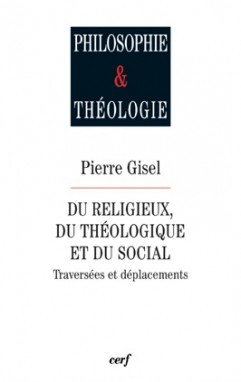Cet ouvrage donne un aperçu des derniers travaux de l'auteur. Articulés à une mutation affectant le religieux au cœur du social occidental qui fait éclater les circonscriptions établies (philosophie, théologie, sciences des religions, sciences humaines), par-delà la diversité des héritages et des manières de considérer l'humain, ce qui le traverse, le mobilise et l'affecte. La première partie touche des modifications dans l'approche des phénomènes en cause. Où sont en jeu les motifs de la transcendance, de l'immanence, de la singularité, de ce qui arrive à nos sociétés, de ce qui les travaille et s'en dérobe. La deuxième partie reprend des dossiers d'histoire contemporaine de la théologie. Où se font voir des déplacements significatifs : la centralité ou non d'une question portant sur de l'ultime, le statut de ce qui apparaît comme nouveauté, une prise en compte des pratiques, ce que peut entraîner un regard sur la mystique, la mise en cause d'un anthropocentrisme, un nouveau positionnement des acteurs (à l'occasion du créationnisme). La troisième est centrée sur ce qui est allégué comme fondement, mémoire ou référence. Une question cruciale au cœur des traditions religieuses et de nos sociétés, liée aux recompositions d'identité, de rapports au monde et à altérité. Que l'auteur examine à propos de deux motifs : le texte biblique et ce dont il est investi, l'homme Jésus et sa construction comme figure. -- This book gives us a glimpse of the author's latest research in relation to the mutation affecting religious phenomena at the heart of Western society, one that explodes established divisions (philosophy, theology, science of religions, humanities), unheeding of the diverse heritages or ways of considering humanity, of what mobilises us and affects us. The first part deals with modifications in our approach to the phenomena in question. Here are discussed transcendence, immanence, singularity, what is happening to our societies, who attempts to work within them and who shrinks away from the task. Part two studies dossiers of contemporary history of theology. Here, significant shifts are visible: the eventual central position of a question relating to the ultimate, the status of what appears to be new and an acknowledgement of practices that can lead to a mystic attitude, the questioning of anthropocentrism and new positions of players (on the occasion of creationism). The third part is based on the alleged foundations, memory and reference. A crucial question at the heart of religious traditions and our societies, linked to restructuration of identities, of relations to the world and otherness, which the author examines through the prism of two motifs: the biblical texts and what they represent, the man Jesus and his construction as a figure.




